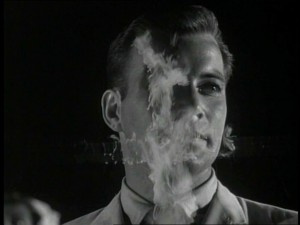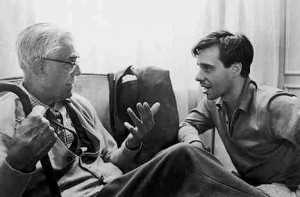It’s difficult to fathom what would have become of the career of schlockmeister Roger Corman if The Intruder, his incendiary 1962 melodrama about race baiting during the tense moments of the Civil Rights Movement, hadn’t been such an unreleasable flop. Rather than failing because of incompetence, the movie never made its mark because it was too searing a statement about too raw a subject, its dialogue too frank to easily take.
Adam Cramer (William Shatner) describes himself as a social worker, but he’s really an antisocial one. The Elmer Gantry of racial divisiveness, the white-suited Cramer storms into a small Southern town on the eve of court-ordered school integration and quickly puts his oratory skills to work. The locals spit more racial epithets than they do tobacco juice, but they’ve become resigned to the change in the air even if they don’t like it. But Cramer senses that there’s rabble to be roused, and his passionate pleas soon have the townsfolk in a lather.
Even the most liberal person in the community, the newspaper editor Tom McDaniel (Frank Maxwell), was against the forced integration, but after a black church is burned to the ground, he has a change of heart. But the interloper quickly has the scribe outnumbered and McDaniel and the black students reporting for class at white schools may be in grave danger.
Despite some writerly plot twists, Corman’s feel for the material and Shatner’s scary intensity make this picture one of the finer B-movies you’ll ever see. But it was a one-and-done reach for greatness by the director. When The Intruder proved too tough a sell, Corman resigned to be satisfied as an entertainer who buried anything meaningful very deep in the subtext. The material he worked with was never so rich again, and his sharp eye for composition on display here grew fuzzier as the screenplays grew worse. Of course, if he hadn’t turned to profitable dreck, Corman likely wouldn’t have been in a position to have midwifed filmmaking careers for Scorsese, Coppola and Bogdanovich, among others. But no matter what is and what might have been, The Intruder remains a testament to Corman’s early abilities.• (The Intruder just became available for streaming on Netflix.)
••••••••••
Recent Film Posts:
- Strange, Small & Forgotten Films: They Came Back (2004)
- Classic Film: The Rapture (1991)
- Recent Film: Somewhere
- Recent Film: Another Year
- Classic Film: The Truman Show (1996)
- Classic Film: Salesman (1968)
- Classic Film: Night of the Living Dead (1968)
- Classic Film: The Conversation (1974)
- Classic Film: King of Comedy (1982)
- Recent Film: Dogtooth
- Classic Film: RoboCop (1987)
- Recent Film: Marwencol (2010)
- Classic Film: Being There (1979)
- Classic Film: Woman in the Dunes (1964)
- Classic Film: The Man in the White Suit (1951)


